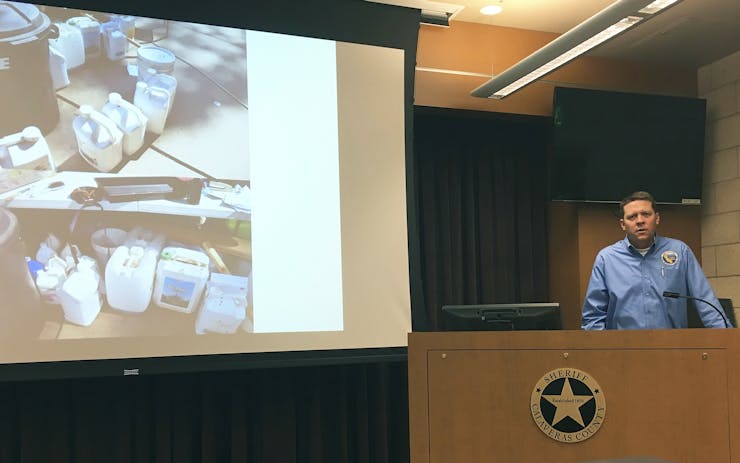SAN FRANCISCO (AP) — A California county auditor is accusing a sheriff of improperly spending some of the $1 million his department received in fees from legal cannabis growers to go after illegal operators.
It’s the latest skirmish over pot in a rural county confronting a massive influx of marijuana growers in the run up to Jan. 1 when recreational cannabis sales becomes legal in California.
Calaveras County sheriff Rick DiBasilio denies the auditor’s charge that he can only use the money for background checks and other permit-related activity. He says busting illegal pot operations is necessary to regulate marijuana in the county, and is working with county officials on resolving the issue. The sheriff declined further comment.
“So far there's been very minimal corrective action from the sheriff.”
California counties and cities have been wrangling with whether to allow recreational cannabis operations within their borders since voters passed Proposition 64 in November. Some have already enacted outright bans while others embrace marijuana as a financial boost.
In Calaveras, residents are deeply divided over the county’s year-old decision to permit medical marijuana farmers who pay $5,000 application fees and pass background checks. Marijuana foes said the county’s new ordinance has attracted a large number of undesirable drug dealers, leading to higher crime and community upheaval.
Four of the five supervisors who enacted the ordinance last year have been replaced by candidates who vowed to repeal the ordinance and ban all marijuana operations. But their plan to repeal has been slowed by legal threats from the farmers who have already paid a combined $3.7 million in fees to the county.
It’s those fees that auditor Rebecca Callen said the sheriff improperly tapped to help finance cannabis farm raids and arrests.
Callen said in an interview with Capital Public Radio KXJZ she has been warning the sheriff of her concerns, but it appears he has spent about $120,000 on law enforcement activities not related to the marijuana ordinance. She believes money collected from the permits should only be spent for things such as background checks and other permit-related activity.
“So far there’s been very minimal corrective action from the sheriff,” Callen told the station. Callen did not return several phone calls from The Associated Press to her office and home voicemail this week.
In a prepared statement Thursday, the sheriff said he has “resolved” the issue with county lawyers and the board of supervisors.
“We are aware of the concerns raised by the use of certain funds for eradication activities, and have been in useful negotiations to resolve differences in the interpretation of applicable law,” DiBasilio said.
County administrator Tim Lutz said Thursday that he believes the sheriff has spent the marijuana fees appropriately, but said officials were working on updating and clarifying its cannabis regulations.
The rural county is nestled in the Sierra Nevada foothills about 125 miles (200 kilometers) east of San Francisco. It has always attracted marijuana growers because of its temperate climate, inexpensive land and proximity to urban areas.
But the region’s popularity as a marijuana destination soared after a 2015 wildfire that killed two people and destroyed 900 buildings, turning forests into prime farmland and depressing real estate prices even more.
Outside growers, many paying cash to landowners motivated by the fire to sell, flooded in, overwhelming local law enforcement officials and county resources.
“It was a perfect storm,” Lutz said.





